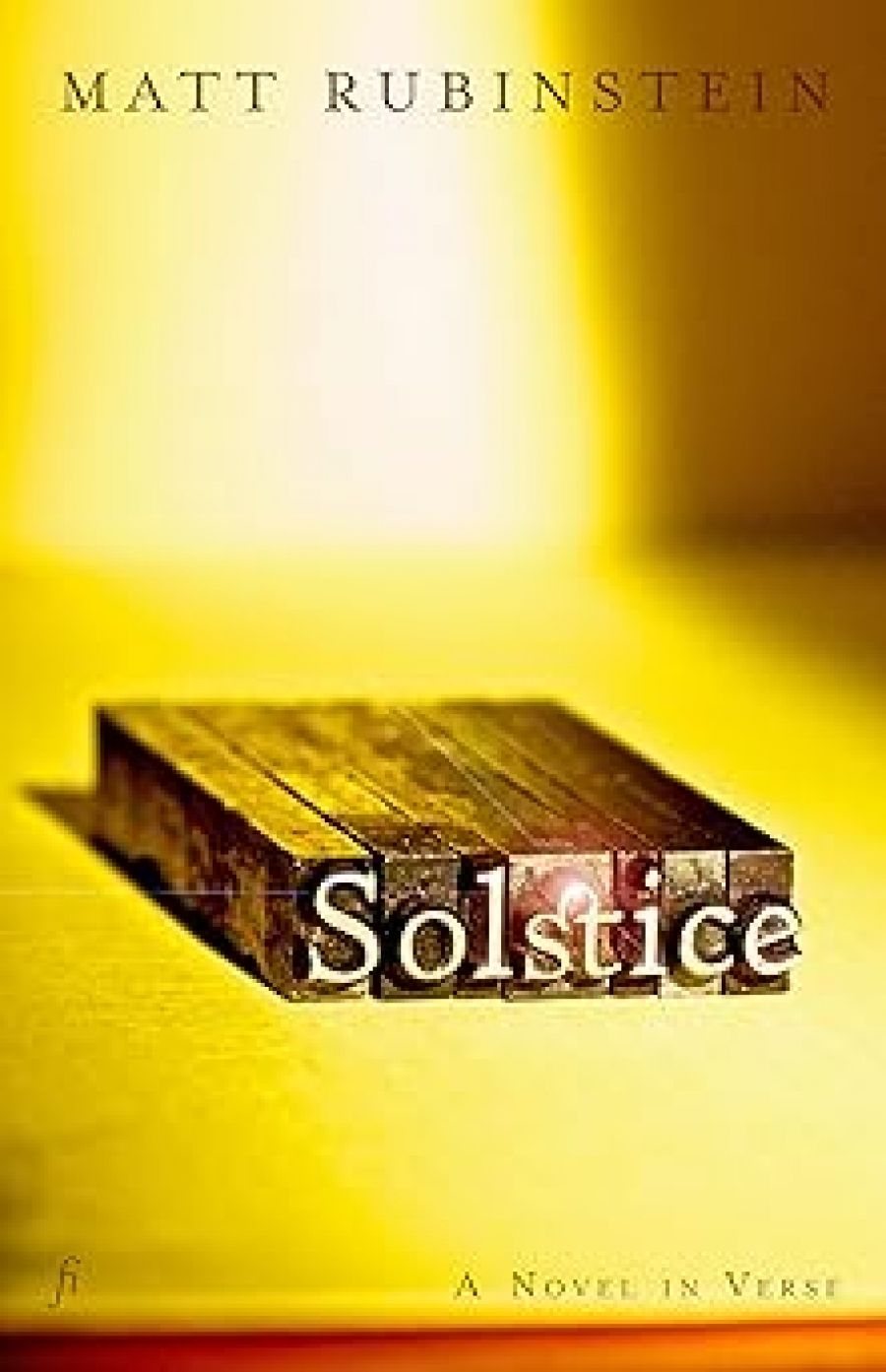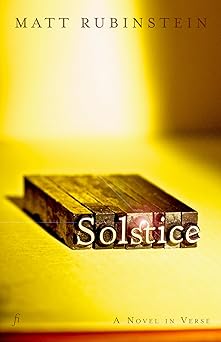
- Free Article: No
- Contents Category: Verse Novel
- Review Article: Yes
- Online Only: No
- Custom Highlight Text:
When reviewing Matthew Rubinstein,
One is tempted to revert to rhyme.
This opus he has undertaken
Has left me somewhat pale and shaken
At the audacity of his task.
What possessed him, one well may ask
To undertake this mammoth effort?
To play with all that he’s been taught
From Seth, Shakespeare and Tolkien too
It’s really quite a thing to do.
But does it work? Now there’s the rub …
What future for this gifted cub? - Book 1 Title: Solstice
- Book 1 Biblio: Allen and Unwin, $14.95 pb
- Book 1 Cover Small (400 x 600):

Bright, in a word, I’d have to say. Solstice is indeed an ambitious project, written in verse, with antecedents including The Golden Gate by Vikram Seth (to whom Matt pays glowing tribute in the novel) and Shakespeare - Solstice echoing Midsummer Night’s Dream both in form and storyline. Matt, at the tender age of twenty, it seems, has taken the postmodern bull by the horns. He has managed to ‘sample’ some exemplary texts and come up with a work that is bound to set him on the path of literary recognition, for the complexity of his task alone.
However, there are some rough patches in Solstice, particularly conversations between the characters that tend towards the awkward and unnatural, but this is, I think, Rubinstein’s major conundrum. There is unavoidably a problematic tension set up by the use of verse. The form lends itself to complicated language as the author tries to find a rhyme to fit.
And yet the characters are not faerie creations; they walk the banal firmament of the last decade of the twentieth century in a land where inverted class snobbery rejects any eloquent extravagance as pretension. (Ironically, this is not the case when the language is purloined wholesale from some New Age guide to the counter-culture or a cultural studies thesis.) So how do you talk about the forthcoming lunch date where the heroine is about to dump her boy in iambic tetrameter with the ghosts of Melrose Place haunting the linguistic space? When Vikram Seth gave the world The Golden Gate he managed to cross-fertilise the inanities of San Francisco’s thirty-something set with the depth of his scholarship and his credentials as a smooth world citizen. Hence it is the novel that has so impressed us all and Matt Rubinstein too. The holes in Solstice are due perhaps to the writer’s relative lack of experience and the fact, ironically again, that he will inevitably be compared with Seth since he has unabashedly stolen a very good idea.
On the problems involved in writing a novel in iambic tetrameter, I suspect there may be something quite soothing about it in much the same way as a child’s nursery rhyme can come naturally. If the form dictates everything as it does in this case, some of the problems of writing may be, strangely enough, lessened. You know you are searching for something to rhyme with the last line, and that may help to formulate the words from the otherwise unconstructed ether. It may be similar to what British novelist Michèle Roberts told me recently she sees one word chasing the next as they are written down as being what makes writing happen, allowing the unconscious to be freed.
There are some truly delicious moments in Solstice, where the tricky task has been achieved. The action takes place over the course of one day. The four main characters’ lives interweave in the fallout from world-weary loneliness and love-gone-wrong. While Matt rarely leaves reality, there are moments when he takes off into the stratosphere on the wings of his language. I loved his description of the ‘Herculean quest’ presented to the young hero who has been left to keep house while his father is away, and now is faced with ‘chivalrously rearranging/The minions of disorder’ before his father returns. At this level Rubinstein displays some inspired humour. It is the more metaphysical problems that create awkward pauses in an otherwise enchanting debut.


Comments powered by CComment